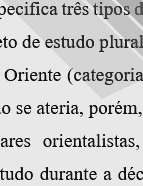

................................
Thus, while the Marxist historians who began their journey in the 1940s - uncoincidentally those who were also closest to the first Annales - sought to hold their works up as exemplary responses to the limits of the old Political History, which tended to ignore the social-economic factors of the historical process, historians such as Sá and Tengarrinha, who began their activity in the 1960s, took pains to rescue the political from the institutional domain in which it had tended to be circumscribed by that old Political History. While works such as Castro's struggled to include the economy in the historiographical agenda, studies such as those of Sá and Tengarrinha contributed to extending the analysis of politics beyond its individualist and elitist confinement.
In other cases, however, it is more difficult to position Portuguese Marxist historians on the side of the historiography which gave greater importance to the weight of the economic structure, or, alternatively, on the side of the historiography which described the autonomy of political action in relation to its own structural conditions. Such is the case, for example, with Álvaro Cunhal's analysis of the events of 1383. While this analysis referred to the issue of the dominant modes of production in a given historical era– in line with historians such as Armando Castro -, with Cunhal focusing on the transition from feudalism to capitalism, it also took the question of class struggle into consideration - and here in line with historians such as Victor de Sá -, reporting on dissensions between what Cunhal referred to as the bourgeoisie and the "rudiments of the modern proletariat".
Vanguardism and the Common
Finally, a third problematic strand may be identified around which Portuguese Marxist historiography developed. It is no longer a question of problems concerning the structural determinants and autonomy of action, but rather of issues related to the form of this very same action. These issues were particularly apparent in the work of historians such as António Borges Coelho, whose initial studies were produced in the prisons where he was incarcerated by the regime between the 1950s and the early 1960s. Especially relevant in this regard was the importance attributed to the issue of concelhos [municipalities] (Coelho, Comunas ou Concelhos [Communes or Municipalities], 1971). In Borges Coelho's view, these were not simple concessions of royal power but historical realities with - if the expression can be imported to the case of Portugal - "a bottom-up" construction.
